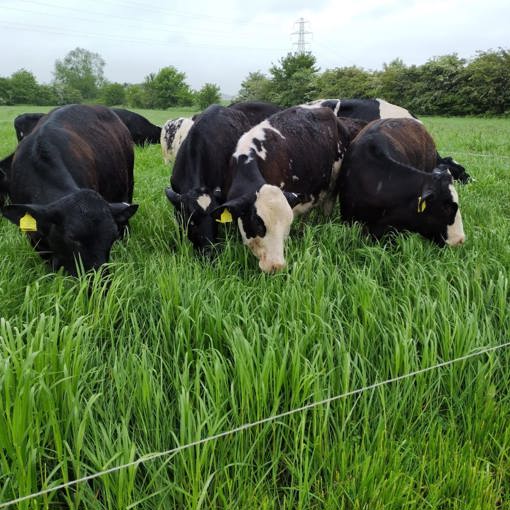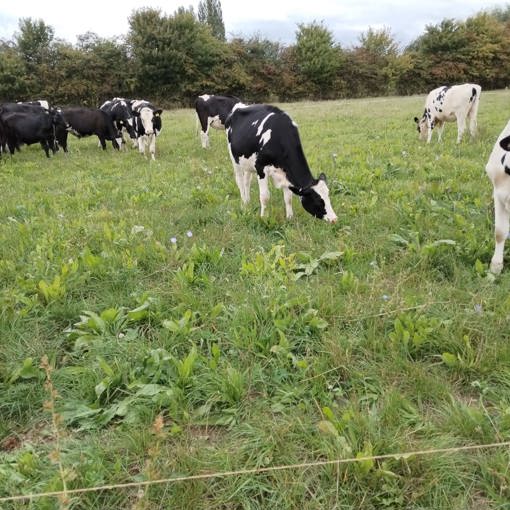Increasing numbers of dairy farmers are integrating herbal leys into their rotations. With more unpredictable weather patterns and increased pressure on farmers to reduce carbon emissions on farm, herbal leys – also known as diverse swards – may be able to provide opportunities for increased farm resilience. A new field lab is being set up with Farm Net Zero in Cornwall to find out more.
The benefits of herbal leys:
- Increase in species diversity
- Greater rooting depth
- Mineral exchange properties
- Higher carbon storage potential
- More resilient during the summer grazing period
- Have support from numerous agri-environment schemes
Researching how to get efficient milk production from herbal leys
However, with efficient milk production being a key concern on dairy farms, farmers need further reassurance that herbal leys will not have a negative effect on producing enough high-quality milk. With these concerns in mind, a group of farmers are launching a new field lab, through the Innovative Farmers programme in collaboration with Farm Net Zero (FNZ) in Cornwall to investigate the impact that grazing herbal leys has on milk production.
To kick start the field lab, dairy farmers met last month at Phil Kent’s FNZ monitor farm near Wadebridge. Andrew Brewer, a FNZ Demo farmer based near St Columb, shared his positive experiences following a two-year trial monitoring milk production from his herbal leys. During his trial with Farm Carbon Toolkit, Andrew split his herd into two groups. One group grazed on a mixed species sward, and the other grazed on a ryegrass/clover ley.
Farmer perspectives on herbal leys
Milk yields and constituents were closely monitored, and Andrew shared with the group that:
- Although fat and protein percentage were lower in the herbal ley group, overall his yield on milk solids was higher due to increased volume yield.
- The herbal leys were slower to respond in the spring, peaking late spring, and with clovers and chicory coming into their own in the hotter summer months.
- Andrew benefitted from a reasonably steady growth curve, allowing more of a wedge to be built up as the autumn approached.
- Andrew has not used artificial fertiliser for four years, resulting in a significant reduction in costs due to the reduced inputs but with no reduction in cow performance or impact on overall forage production.
Members of the field lab
Phil Kent, the event host, took the group out on a farm walk and shared how herbal leys have made his system more resilient. Situated on the north Cornish coast, Phil’s farm is typically very dry. However, the diverse sward allows his cows to continue grazing during dry summer periods when other swards burn up, which is key to his maintenance of a resilient grazing operation.
The researcher for the field lab is Dr Daniel Enriquez-Hidalgo, an expert in dairy from the University of Bristol Veterinary School. His presentation detailed the impacts of herbal leys on dairy production. Alongside Dr Hannah Jones from Farm Carbon Toolkit, he explained how the species composition of a herbal ley will naturally change throughout the grazing period, with the grasses heading earlier in the season, clovers becoming more dominant in the summer, and plantains and chicory producing well into the autumn.
Daniel’s involvement in the field lab, and that of additional farmer triallists, will add scientific rigour to this vital research. The new trials intend to collect detailed monthly records of milk quality, yield and sward quality to work out what impact the forage composition has on the milk. Sward growth will also be compared to rainfall data to better understand the resilience of herbal leys in extreme conditions.
For more information on the trials contact Laura on info@innovativefarmers.org
Related news

03 March 2023
Pasture resilience
Quality of on-farm data critical in developing new pasture management tool

20 September 2022
Pasture resilience
Mob grazing for dairy: can tall grass unlock underperforming fields?

15 May 2023
Nutrient management